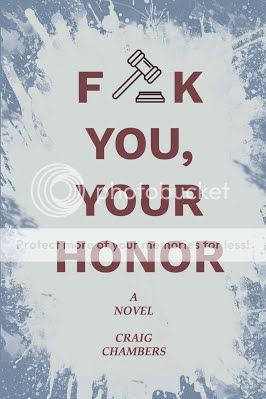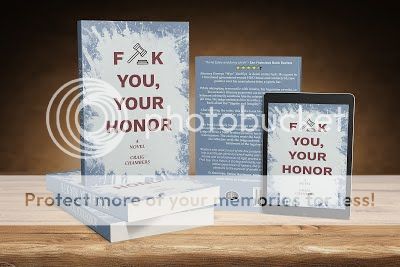
Literary Fiction, Satire
Date Published: June 2017
Publisher: Black Letter Editions
F*ck You, Your Honor is a satirical literary novel about a low-end attorney and real estate broker who is ordered by a judge to write a book to save his law license.
Attorney Darwyn “Wyn” VanWye is down on his luck. He squats in a foreclosed government-owned HUD home and conducts his law practice over his smart phone from a sports bar.
While attempting to reconcile with Amalia, his Argentine ex-wife, so his excessive alimony payments can be terminated, Judge Solomon arbitrarily sanctions him for misconduct. Instead of a fine or jail time, the judge sentences him to write a sixty-five thousand word book about the “dignity and integrity” of the legal system. Wyn believes the judge is out to get him.
After resisting the order, F*ck You, Your Honor is the book Wyn writes to hopefully save his law license. Will he succeed in placating the judge and winning back his ex-wife?
The book is loosely inspired by an article in the Wall Street Journal about a pharmaceutical executive who was sentenced by a Federal judge to write a book to show penance for lying to the Federal Trade Commission. The executive wrote the book, but instead of writing the reflective work the judge ordered, he denounced the unfairness of the legal system.
What if a lawyer was ordered to write a book like this? His first instinct would be to try to argue his way out of it.
Excerpt
29
Another day, I met a new prospective client at The Overtime who wanted to retain me to file for a divorce. I was talking to Cora who was busy with the lunch crowd when the prospect arrived thirty minutes early. I hate clients who are too punctual; it shows they are controlling. It’s rude. Here am I busy working on another case, and a prospective client comes in, and I feel the pressure of her waiting for me across The Overtime. But I immediately forgave her as soon as I saw her.
I must say, if ever I was tempted to start a sexual relationship with a client, this would be the one. After the case was over, of course. I could easily see myself ridding my new client of her soon-to-be ex-husband, and, maybe months later, after enough time had passed… my thoughts wandered off for a second and then wandered back to the case. Although she was probably in her late thirties, she had aged well; beautiful lips, a sensual curved neck. She had a rich, Southern drawl.
As I introduced myself, she let out this warm vibe. I made her fill out the questionnaire while she waited. Questions about the date and history of the marriage, names and addresses, the number of children, any instances of domestic violence. All based on statutes and precedent that I would need to file her case.
I noticed by her questionnaire she lived in a prestigious area of overpriced bungalows and Tudors that surrounded a big park near downtown. The park had a lake and a boathouse. Amalia and I used to go down there some afternoons in the summers for picnics and free concerts. I think part of my attraction to her, however, subconsciously, she reminded me of Amalia.
I never really thought that I had a type. I guess I do. I never liked the competitive career women, and just as important, they never liked me.
This woman was warm and kind. She was of Spanish or Mexican origin, but unlike Amalia, she had been totally Americanized. She spoke perfect English, ate bland food at The Overtime, though she dressed flamboyantly. She worked as a branch manager in a bank. She complained about the inflated prices of real estate and the ridiculous number of Starbucks. On street corners. In grocery stores. In strip malls. Being a banker, I guess she did the math, and $6 a cup is a lot for a cup of coffee.
She confided her husband had not touched her in a year. Unbelievable! I wanted to leap out of my chair and kiss her. I hadn’t touched Amalia in over a year, either.
The first thing I did, I asked her if she and her husband could reconcile. There’s a ninety-one day waiting period for a divorce, to give the couple time to cool off, maybe go to counseling.
If the parties went through a divorce, I could make thousands of dollars. If the couple can’t get along in the divorce, and both get lawyers, a couple can blow through their life savings. If the parties reconcile, the divorce is either dismissed or never filed, and I earn, well, nothing. Amalia called this “chewing my paw.”
I thought again about my divorce. Some of the arguments with Amalia were just silly.
One time, we fought over a banana. I had left a banana on the kitchen counter the night before court to pack with my exhibit books. I usually brought a snack to help me through a whole day trial. Some judges allowed you to bring food into the courtroom to eat on the breaks; others didn’t. Without even telling me, she ate the last banana.
I have to admit, at the time, I was furious.
Another time, she packed me a lunch, put it in my briefcase, and took out my notebook with all my notes for a hearing. I appeared in court, totally unprepared. Sabotaged by Amalia. Lucky for me the case was continued. We went round and round as to who was at fault on this one.
My arguments with Amalia were passionate; never violent. They almost always ended in laughter. For a few years, we had a dog, Knuckles, though the dog eventually died. One day we took him to the vet. She wrote the dog’s name down on a form at the vet’s office: ‘Nuckles’. I informed her the word began with a silent K. The word didn’t register with her, and she had a hard time believing me. I can still hear her making the K sound, trying to pronounce it, trying to make sense of the word.
The English language mystified her. The next time she wrote out a grocery list, along with the milk and some more bananas, she asked me to pick up a package of ‘knoodles’.
I may not be the best one to give a guy marital advice, but still, here goes: Sleep with your wife from time to time. Be nice to her. Otherwise, keep your penis in your pants. These, along with financial difficulties, are the main causes of a divorce.
I explained the essence of a dissolution of marriage, showing off my knowledge with citations of statutes and case law. The first step after a divorce is filed—the parties exchange financial statements and supply the supporting documentation. I call this making the pie. Once you make the pie, you divide the pie, calculating how to fairly distribute the personal property, the assets and debts between the parties. Every asset is taken into account. From the smallest savings bond to the parties’ coin collection, each coin valued and divided coin by coin. The court will even divide the porn.
A divorce works like this: most lawyers review the financial documents, and based on the factors in the statute, calculate what their client is reasonably entitled to. Then they double it. So they will stay employed.
The most accurate definition of a divorce I copied from a well-respected, influential, and prestigious legal journal.
“A divorce is a domestic legal proceeding which takes a highly dysfunctional family, and legally divides it into two highly dysfunctional families.” That was the best definition I ever heard.
I gave her advice about the fundamentals of a divorce. There were statutes about temporary orders, how child support was calculated, parenting time was determined, alimony figured, property, pensions, and debts divided. Hopefully, there’s not much to fight about. If there are no children, thank God. That’s where people fight the most. They also fight about money, until they see how much money they will have to spend to fight about the money. First, a couple doesn’t need to agree to get a divorce. That hardly makes sense. If a couple cannot agree on who will pay the sewer bill, they cannot agree on the divorce. Second, if one party says the marriage is broken, it’s broken. End of story. Agreements of the parties or other court orders are enforced through contempt proceedings, which is an allegation of a deliberate violation of a court order under Rule 107. There are two types of contempt: punitive and remedial.
Remedial contempt is when the judge is mad enough at a party for violating a court order, he or she can put you in jail until you comply. Punitive contempt is when a judge is real mad, he or she can simply put you in jail. (Amazing, though, how a deadbeat dad who owes back child support, has no money, no job, no savings, and no prospects—through some miracle of math or accounting is able to purge a remedial contempt by coughing up ten thousand dollars after spending only one night in jail.)
The smartest thing any divorcing couple can do is sit down and work out a compromise. Settle some of the divorce or all of it ahead of getting the lawyers involved. Write it on a napkin and sign it. It doesn’t matter what form it is in.
A guy usually knows he has to share the assets of the marriage with his wife, especially if the wife is a housewife. A woman thinks differently. She doesn’t like to share. All of the assets are hers; all of the debts are his. That was the story of my divorce.
I gave my prospective client some good advice: “Empty all the bank accounts,” I suggested. “If you don’t, your husband certainly will. Once he finds out you are thinking about filing the divorce.”
This was sound legal reasoning. Before a divorce is filed, there are no court orders in place to protect the assets so the court can divide them fairly. One parent can run off with the children. Or abscond with all the assets and gamble them away in Las Vegas. Once the divorce is filed or if the money disappears in contemplation of the divorce, you will have to fully account for yourself and your finances.
About the Author
In his junior year in college, Craig Chambers attended the University of Leeds in England. He did not attend a single class, traveled around Europe instead. He came back and took the final exams, only to be disappointed that he got a 1 in English. He later learned that “First Honors” was the highest grade.
In the ‘80s he became a real estate broker while he worked on developing his writing style. Chambers attended law school in the ‘90’s because he observed a real estate closing where the lawyer messed up the deal, but still charged a fee of $1,000. He figured he could mess up a real estate deal for a lot less than that. His literary satire on the legal system, F*ck You, Your Honor, was released in June, 2017. He resides in Littleton, CO.
Contact Links
Purchase Links




























